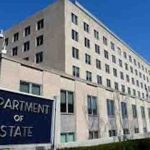London, March 22 (AFP/APP): UK lawmakers endorsed Wednesday a crucial part of Prime Minister Rishi Sunak’s post-Brexit deal with the EU to overhaul Northern Irish trade rules, despite a rebellion by ex-leader Boris Johnson and other Conservative eurosceptics.
The vote on the so-called “Stormont brake” — which hands Northern Irish lawmakers an effective veto over new European Union rules being implemented in the UK province — won the backing of 515 MPs, with just 29 opposed.
The government can now move forward with the new Windsor Framework agreed last month with Brussels, with Foreign Secretary James Cleverly set to discuss its roll-out at a meeting Friday with EU vice-president Maros Sefcovic.
However, in a rebuke to Sunak that could have implications for his political authority, 22 Tory MPs — including former prime ministers Boris Johnson and Liz Truss — opposed the brake, while another 48 declined to vote.
The refusal to support the government threatens to reawaken deep divisions within the governing party over Brexit.
MPs from Northern Ireland’s largest pro-UK party, the Democratic Unionist Party (DUP), also voted against the brake, suggesting that Sunak will struggle to get the party to resume power-sharing in Belfast.
The Stormont brake is a key cog in the new framework, which aims to reset strained ties between Britain and the bloc.
But it is also hoped the pact can pave the way for devolved government to restart in Northern Ireland, after the DUP collapsed the executive last year over its opposition to existing post-Brexit trade rules.
Northern Ireland is still in the European customs union and single market because of the need to keep an open border with EU member Ireland to the south as part of a 1998 peace deal.
With the rest of the UK out of the EU, that has caused headaches on how to protect the single market on goods heading across the Irish Sea and, unionists claim, made a united Ireland more likely.
– ‘Get this right’ –
DUP leader Jeffrey Donaldson said the framework failed to solve its concerns about Northern Ireland’s ability to trade with the rest of the UK.
“That is the bottom line for us,” he told MPs during a 90-minute debate ahead of the vote.
“Until that is resolved, I can’t commit to the government that we will restore the political institutions.
“It is what I want to do, but we need to get this right.”
Earlier, Johnson, whose much-anticipated parliamentary grilling about the “Partygate” controversy was paused so that MPs could vote, called the framework “not acceptable” as he vowed to oppose it.
He urged the government to stick with legislation he helped craft that would unilaterally disregard existing EU rules in Northern Ireland until Brussels agreed acceptable alternatives.
But that draft law, introduced last year, prompted the bloc to threaten reprisals and a damaging wider trade war, further souring relations.
The European Research Group (ERG) of Brexit hardliners in the Conservative party has also criticised the brake, calling it “practically useless” following an analysis by its own legal experts.
The group — thought to include around a dozen Tory lawmakers, down from triple that number several years ago — urged its members to vote against it.
But given the main Labour opposition had said it would support the measure, its approval was never in doubt.
Follow the PNI Facebook page for the latest news and updates.









